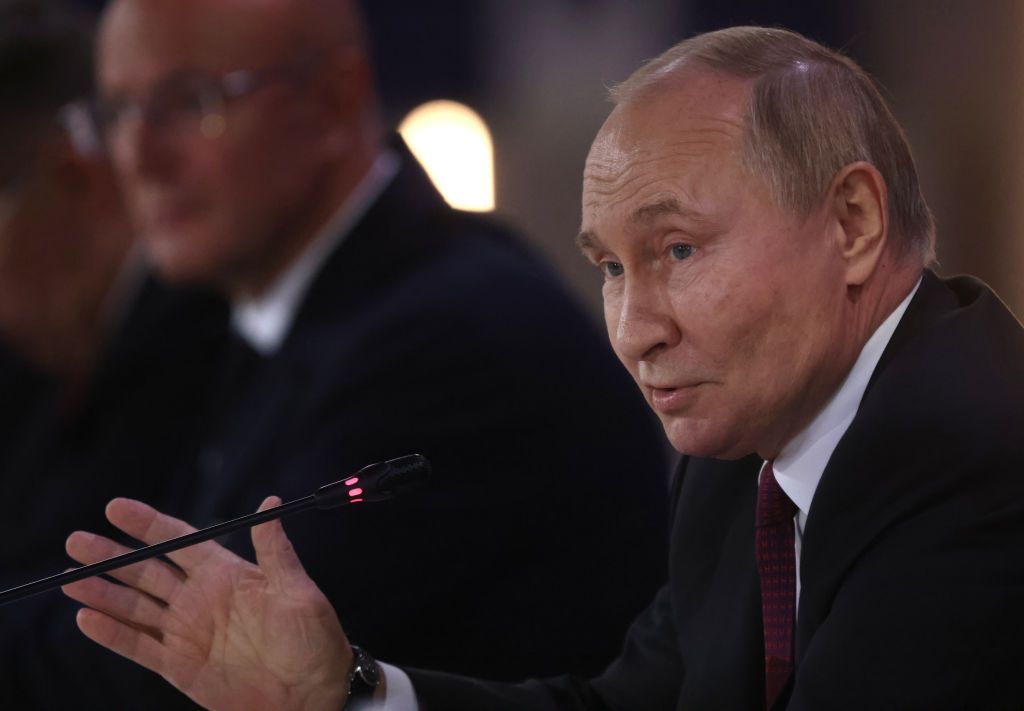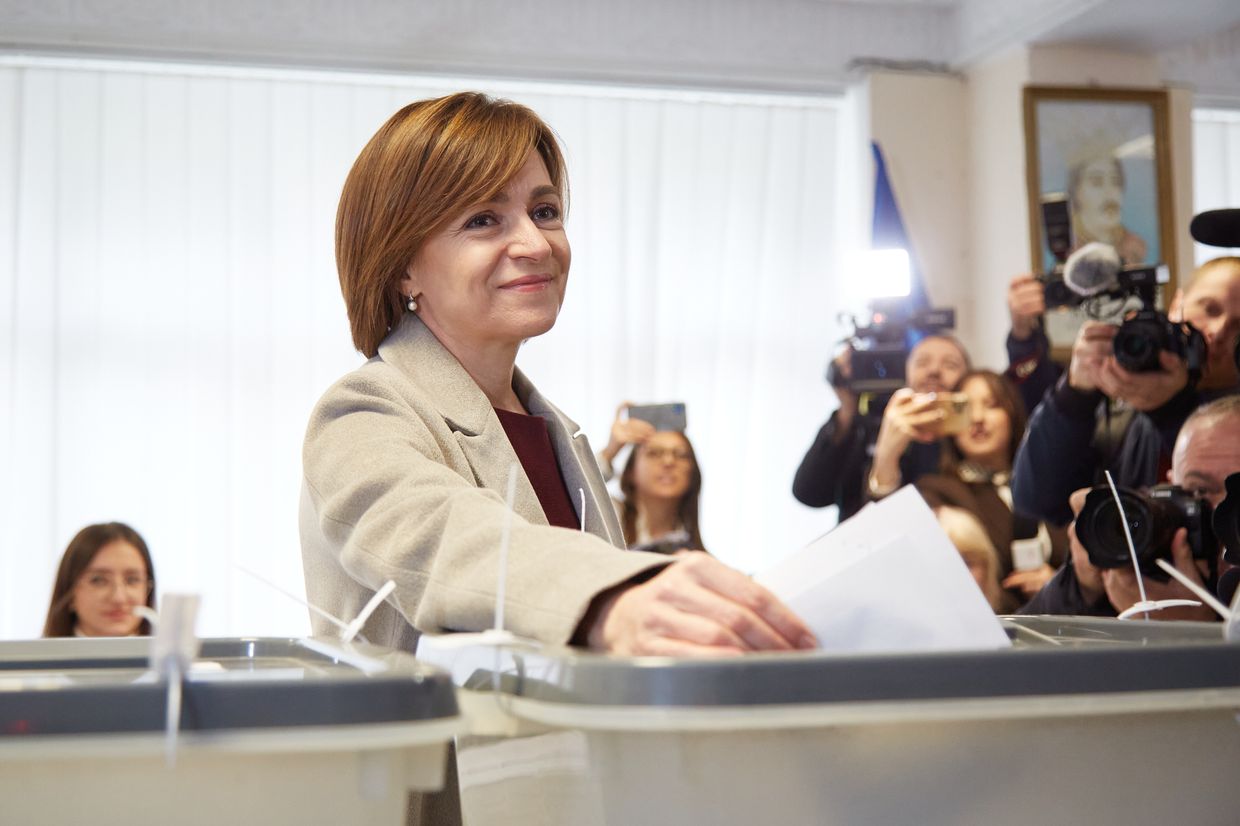Opinion: Shifting the paradigm in Ukraine
It is always difficult to extricate ourselves from long-held paradigms and see the world anew. This has been poignantly obvious with Biden, who has clung to “escalation avoidance” in Ukraine, long after that paradigm turned perverse and deadly.

Ukrainian President Volodymyr Zelensky (L), U.S. President Joe Biden (C), and U.K. Prime Minister Keir Starmer (R) pose for a photo on the sidelines of the 79th Session of the United Nations General Assembly in New York, U.S., on Sept. 25, 2024. (Leon Neal/Getty Images)

Marci Shore
History professor at Yale University
Last month, a Russian missile blew apart an apartment building in the center of Lviv. I sent a message to a friend who lives there: Was everyone okay? “Yes, we were lucky,” he replied. “Our friends who live just next to us, a young woman and her three daughters, are dead.”
Then I saw the footage. The neighbor, Yaroslav Bazylevych, his face cut and bloodied, watched as the bodies of that young woman – his wife – and their three daughters were pulled from the rubble. A photo from the funeral, showing Bazylevych staring into the open coffins, should enter the pantheon of iconic images of atrocity: the little Jewish boy with his arms raised in the Warsaw Ghetto, the naked Vietnamese girl fleeing her village after a napalm attack, the body of the two-year-old Syrian boy washed ashore on a Turkish beach.
The hypersonic Kinzhal missile that killed the Bazylevych family, like the one that hit the Okhmatdyt children’s hospital in Kyiv two months earlier, was fired from deep inside Russia. The launch sites are not a mystery; the Ukrainians know where they are. The missile that killed Yaroslav’s wife, Evgeniya, and their daughters was launched from a MiG-31K aircraft in Russia’s Tula Oblast.
The aircraft took off from Savasleyka, a military air base about 300 kilometers (186 miles) east of Moscow, about 866 kilometers (538 miles) from the Ukrainian border, and 1,386 kilometers (861 miles) from Lviv. By car, the drive would take over 20 hours; a Kinzhal can travel that far in as little as seven minutes.
But Ukrainians are not permitted to use the weapons Americans have provided to destroy the launching sites; they have to wait for the missiles to arrive. Everyone knows it is absurd, but it is not their decision. It is the decision of the U.S. government, and in fact of one man, President Joe Biden – a good man with the right moral instincts, but a man who has been unable to see beyond the paradigm of “escalation avoidance,” long after that paradigm has become perverse and deadly.
"It is the decision of the U.S. government, and in fact of one man, President Joe Biden – a good man with the right moral instincts, but a man who has been unable to see beyond the paradigm of “escalation avoidance,” long after that paradigm has become perverse and deadly."
Admittedly, it is hard to extricate ourselves from long-held paradigms and see the world anew, all the more so as we age. We are always attached to the previous reality. War and revolution rupture time, throw it “out of joint” in Hamlet’s words. Suddenly, a state of affairs that has prevailed for years or decades ceases, as if in an instant, to exist. Yet the thinking shaped by it can linger long afterward.
This is especially poignant in Biden’s case. In October 1991, he chaired the U.S. Senate Judiciary Committee, presiding over hearings to investigate law professor Anita Hill’s claims that Supreme Court nominee Clarence Thomas had sexually harassed her a decade earlier. Thomas’s defenders portrayed Hill as a rebuffed single woman prone to chasing male attention.
John Doggett, a Texas attorney and friend of Thomas called to testify on Thomas’s behalf, recounted that Hill had once expressed disappointment when he canceled a dinner date. “Ms. Hill’s fantasies about my sexual interest in her were an indication of the fact that she was having a problem with being rejected by men she was attracted to,” Doggett told the committee. Biden responded to Doggett’s claim: “It seems to me that is a true leap in faith or ego, one of the two.”
Listening over the radio 33 years ago, I understood that Biden believed Hill and cringed at her humiliation. He took care to emphasize that she had not wanted to come forward. Still, Biden lacked the daring to step outside of his assigned role, to see the situation anew.
But the inclination to avoid radicalism can have radical consequences. Biden’s moral sensibility was respectable, but his failure to take a bold step had dire repercussions, for it allowed Thomas to take his seat on the Court. The moral bankruptcy of today’s Supreme Court, in which Thomas plays a key role, has left Americans facing an aspiring dictator whom that Court, in a decision supported by Thomas, has now granted near-total impunity.
It is not ill will or callousness that has defined Biden’s career, but rather a lack of daring. Indeed, that seems to be the tragic flaw of a fundamentally decent man. In a world where narcissistic psychopaths exert a disproportionate influence in shaping events, Biden stands out for his empathy. But that is not – and cannot be – enough.
"It is not ill will or callousness that has defined Biden's career, but rather a lack of daring."
History moves through an interaction between the structural conditions in which we find ourselves and the choices we make. Sometimes the role of individual choice emerges with particular acuity, for better or worse: Franklin D. Roosevelt’s “bold experimentation” to overcome the Great Depression, for example, or Neville Chamberlain’s appeasement of Adolf Hitler at Munich.
Ukrainian President Volodymyr Zelensky’s refusal of the U.S. government’s offer to evacuate him as Russian tanks rumbled toward Kyiv was another such moment. While the Kremlin’s assassins hunted him in the capital, Zelensky walked out onto the city streets at night and recorded a selfie video. “The president is here,” he said. “We are all here.”
Suddenly, nothing was as expected. Ukraine would not fall in three days, as Vladimir Putin had predicted, and be reduced to a Belarus-style Russian protectorate. A massive land war on the European continent, considered impossible before Feb. 24, 2022, had suddenly become the great fact of the early 21st century.
This unlearning to unsee is Biden’s task today. He is no longer young, and his time remaining in power is short. Yet he still can – and should – take a risk, shift the paradigm, and embrace the possibilities, and the demands, of a new historical moment.
“The miracle that saves the world ... from its normal, ‘natural’ ruin,” Hannah Arendt wrote, “is ultimately the fact of natality.” By natality, she meant not only the literal birth of a new generation, but also the new beginnings arising from humans’ capacity to act. For Arendt, action possesses the quality of birth, its consequences unpredictable by its very nature. In Ukraine, inaction – the refusal to permit Ukraine’s government to act in self-defense – possesses the quality of death.
Editor’s Note: Copyright, Project Syndicate. This article was published by Project Syndicate on Oct. 18, 2024, and has been republished by the Kyiv Independent with permission.The opinions expressed in the op-ed section are those of the authors and do not purport to reflect the views of the Kyiv Independent.














